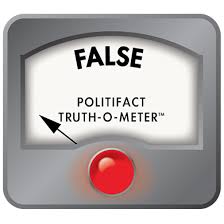A state lawmaker’s claim that two rivers in North Carolina are among the “most polluted” in the nation has been rated FALSE by PolitiFact NC.
But the real problem is not one misinformed lawmaker. It is false and misleading claims by environmental groups – groups that are treated as reputable and rarely questioned, enabling them to spread false information through media and bloggers.
Let me explain.
The notion that the Cape Fear River and the Neuse River are “polluted” by hog farms was the result of some slick political advocacy earlier this year by a group called American Rivers. One of the nifty things American Rivers did was make a list.
Lists are easy for the media to understand. Top 10 this. Most 5 that.
Easy to cover. No thinking required.
American Rivers made a list of the “Most Endangered Rivers for 2017.” They sent the list to the media, and many of them swallowed it whole.
But if you read the fine print, you’ll see that the list has absolutely nothing to do with pollution — or any objective, scientific measures about the quality of the water. Instead, it deftly said the rivers were ‘threatened,’ a broad claim that could be made about most rivers and that, in this case, simply reflects American Rivers’ legislative and public policy priorities.
In this instance, the Waterkeeper Alliance (and specifically, the Upper Neuse Riverkeeper) encouraged American Rivers to include these two rivers as part of its ongoing campaign against the pork industry in North Carolina. Why? Because they want to close hog farms in areas flooded by Hurricane Matthew.
But they ignored a couple of key facts.
First, while Hurricane Matthew caused catastrophic flooding across eastern North Carolina, the pork industry dealt with the hurricane remarkably well. Our state has thousands of hog farms and lagoons, most in eastern North Carolina, but only 14 farms were impacted by the flooding. By comparison, the effects on municipal wastewater treatment plants — which spilled more than 100 million gallons of untreated sewage — were far worse. Regardless, the state’s environmental agency concluded that the sheer volume of water dumped on eastern North Carolina by Hurricane Matthew flushed any pollutants out of our rivers.
Second, the N.C. Pork Council was already working to secure additional funding to voluntarily close lagoons located in flood-prone areas. We’ve long supported this complex and complicated process. Our previous efforts resulted in closing more than 100 lagoons in eastern North Carolina.
While we were working with legislators to secure this funding — some of which was included in this year’s state budget — the Waterkeepers and others were busy making lists and spreading falsehoods.
– Andy Curliss, CEO

